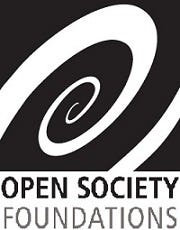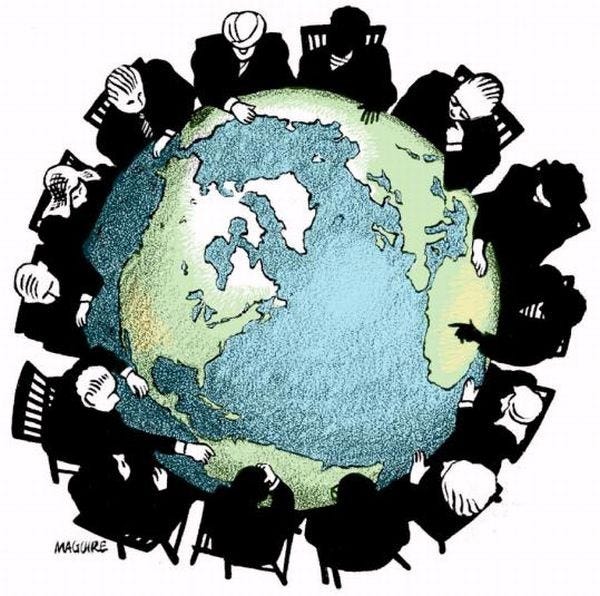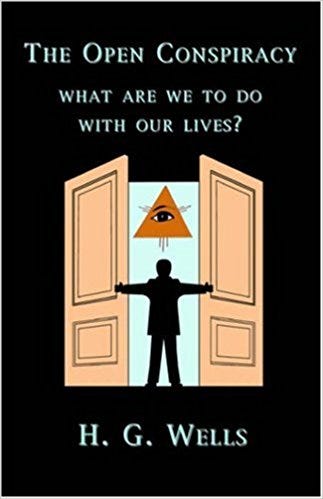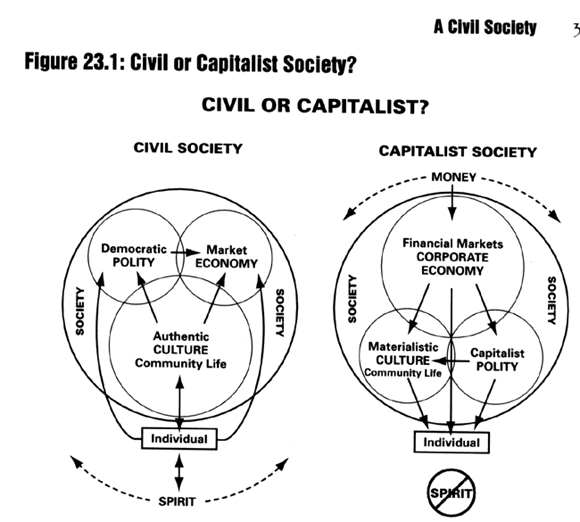“The (global) capitalist system is… an abstract empire.” — George Soros, Open Society: Reforming Global Capitalism
“The real determinant of society is hidden behind the state and the economy: it is the way in which our everyday activity is organised, the subordination of our doing to the dictates of abstract labour, that is, of value, money, profit. It is this abstraction which is, after all, the very existence of the state. If we want to change society, we must stop the subordination of our activity to abstract labour, do something else.” — John Holloway, Crack Capitalism
Who rules the world? This is a central question of political sociology, and also the title of a Noam Chomsky book. Everyone knows that elites rule the world, and that masses can influence it. But more accurately, the world is dominated by an abstract force; a headless hydra that feeds off power itself. That is to say, nobody rules the world. We are ruled by ‘the system’, as I detailed in my coverage of the book The Abstract Society. Globalization is not driven by the agency of individual actors. Rather, it is their role in the system and the system itself that make us all subservient to its machinations. The world is ruled by abstraction, financial and otherwise.
There are macro-evolutionary factors at play — inevitable features of globalization — and we must understand them in order to effectively steer the leviathan back on course. In lieu of leadership, we have deferred authority to the God of money (aka the logic of capital), the ultimate abstraction, and it has spelled out record inequality along with the delusions for its justification. Do you understand the deep implications of this? Nobody is accountable for the conspiracy that is capitalism, yet we all are. To reverse its dehumanizing effects, I consider two convergent approaches to resolving the abstraction of global empire.
The Open Society (Popper, Soros) and The Open Conspiracy (Wells) are mutually exclusive concepts, but they both claim openness and prescribe some form of global governance. The problem with the open society is that it is much like a translucent sliding door that a dog (and occasionally a person) runs headlong into. The latter book is lesser known, but arguably more humanist and prescient, and suggests an actual open door policy. The title literally implies the closed and conspiratorial nature of global capitalism, which over the 20th century has also become increasingly abstract and nonrepresentative.

The Open Society
In the book The Open Society: Reforming Global Capitalism, George Soros refers to global capitalism as “an abstract empire,” in that capitalism is “super-sovereign” and “deterritorialized,” analogous to global empire. “the empire is almost invisible, possessing no formal structure.” (p.171). Thus it is not empire in the traditional sense, but highly abstracted. This is very important because, love him or hate him, Soros is one of those arch-globalists (the subject of many conspiracy theories) and his worldview matters. In a previous post I complemented Soros’s assessment of the global predicament, but in this one I take a more critical tact against Soros.
“An Abstract Empire”
“The first question that needs to be answered is whether there is such a thing as a global capitalist system. My answer is yes, but it is not a thing. We have an innate tendency to reify or personify abstract concepts — it is built into our language — and doing so can have unfortunate consequences. Abstract concepts take on a life of their own, and it is only too easy to go off on the wrong track and become far removed from reality; yet we cannot avoid thinking in abstract terms,’ because reality is just too complex to be understood in its entirety. That is why ideas play such an important role in history- more important than we realize.” p.171 Soros, Open Society
The lesson is twofold: the abstraction ‘global capitalism’ refers to something very real, but we should not confuse it our conception of it with reality, given the complex and amorphous character of the ‘abstract empire.’ It is real, but also unreal and metaphysical. His warning against reification is mainly to make sure people don’t become purely anti-capitalist (throwing the baby out with the bathwater). However, the abstract character does not mean it is ineffable or unassailable. In a way, this should be read as a call for more attentiveness and a detailed abstraction of the problematique. Global capitalism is too abstract. Although power (capital) is decentralized, Soros states that the US is of course the de facto center. However, the fact that the ‘abstract empire’ is super-sovereign and deterritorialized means that the nation-state model of politics is increasingly in crisis, and is increasingly non-representational (democracy). This is why Noam Chomsky and many others admit the obvious; that democracy has largely been reduced to a facade.
Everyone knows this, yet powerful interests — both liberal and conservative — are doubling down on political authoritarianism rather than cosmopolitanism, inclusion, cooperation, truth, and trust. Elite politicians and their shadowy power-brokers are pussyfooting (excuse the sexist connotations) around the most serious issues plaguing the world. Soros is no exception, who by default threw his weight behind the dynastic ill-fated “lesser evil” of Hillary Clinton. If the word socialism weren’t so effectively vilified and disparaged, the open society might actually have a chance! Despite elites mastery over information, and the role of think tanks in ‘knowledge production’, the blindspots of elites (vis-a-vis Sanders; an actual paragon of civil society) are truly king-sized. I take a rather harsh tone against Soros in the rest of this article, but it is not discount the progressive contributions that have been made through his philanthropy and OSF.
“I believe the concept of open society could provide some guiding principles to govern international relations, but to serve in that capacity the abstract concept must be transformed into an operational one. To prepare a blueprint for a global open society would run counter to the principles of open society; it would also be an exercise in futility. Open society cannot be designed from first principles: It must be created by the people who live in it.” Soros, p.309
Soros, a self-described armchair philosopher, believes in the power of ideas but is skeptical that a global consensus can be formed based on principles alone, due to human fallibility. This does nothing but reinforce the stereotype that globalists are snooty and secretive. Specifically, he writes that “it is not possible to gain general acceptance for those principles simply by explicating them.” (p.136). The Abs-Tract Organization (TATO) rebukes these assumptions and contends that metamodern society is up to the challenges of universal education, knowledge disclosure, and global truth and reconciliation. However difficult it may be, ‘honesty is the best public policy’ is the new standard, which TATO defines and upholds. Soros goes further in eschewing any abstract plans, opting for a middle way;
“The point is that a globalized society could never satisfy the encumbered individuals’ need to belong. Those who want to belong to a community must look for it elsewhere. A global society must always remain something abstract, a universal idea.” — Soros, p.128
“Is it possible to forge a consensus around the principles of open society? These are abstract, philosophical principles, and it follows from our fallibility that our beliefs are not dictated by reason: So it is not possible to gain general acceptance for those principles simply by explicating them… People must be aroused, fired up, and they must coalesce around a common cause for the common interest to override special interests.” — Soros, p.136
“The solution cannot be the same as on the state level. A global state would constitute a greater threat to liberty than the individual state. Nor can we design a solution in the abstract: That would also contradict the principles of open society.” Soros, p.136

Globalists: “We got this.” TATO: “You’re doing it wrong.”
On the face of it, I see nothing malicious in the explicit education and promotion of open society values globally, but the execution leaves much to be desired. From the huge leak of OSF documents, no conspiracy was revealed but a very boring and overly-strategic bureaucracy was indeed exposed, which only enrages the enemies of open society and reinforces partisanship. In fact, I would be happy to work for or with Open Society Foundations, as an opportunity to learn and perhaps contribute a novel metamodern perspective. This goes against the advice of some my colleagues, who think it better to avoid the taint. To my chagrin, I reached out to some OSF wonks in January (2017) and recieved the following reply:
Response to TATO: “I have checked with my colleagues who work on global idea generation but, unfortunately, this does not fall within their priorities.” — Diana Morris, The Open Society Foundations
TATO’s response to OSF: “You’re going to have to do better than a flat out denial. Soros wanted a Clinton president over Sanders, which [was] a massive blunder, so don’t talk down to me about global priorities, and especially idea generation.”
I believe in directness and honesty, especially under the premise of dialogue, but of course there was no further correspondence. I suggest there are important lessons here for elites. It is supremely ironic that ‘abstraction’, questions of my own execution aside, would not be regarded as important in idea generation, especially given the fact that Soros himself has invoked it in a very important way. Notwithstanding Soros, abstraction is the root of philosophy you nitwits. This kind of gross negligence and condemnation without investigation is exactly what I discuss in detail in The New Reproach of Abstraction. Fortunately, there is a better alternative — the Open Conspiracy — and hopefully the OSF will come around and help finance it.

The Open Conspiracy
The Abs-Tract Organization advocates openly designing abstract solutions to global problems. A decidedly prototypical example of this is found in The Open Conspiracy: Blue Prints for a World Revolution, published in 1928 by H. G. Wells. In typical visionary fashion, Wells anticipated the entropy of society, with its penchant for power and secrecy, and suggested a blueprint for global society that is on par with metamodernism’s open-source principle.
Wells describes the ‘open conspiracy’ as a “scheme to thrust forward and establish a human control over the destinies of life and liberate it from its present dangers, uncertainties and miseries.” Much of his prescriptions have naturally been adapted in various forms, but the neglect of others has compromised the integrity of some of the advances made. The book articulates many insights and reality-checks about religion, education, utopia, socialism, imperialism, and revolution, but given that it is written for a lay audience a critique may be that it trades in substance for style (and how!). Rather than attempt to distill its poetic possibility, I have abridged the list of premises and principles that Wells himself provides in the book:
Initial premises
(1) Governments are provisional, therefore loyalty can be cosmopolitan.
(2) Population growth (self-)regulation relieves the competitive pressures.(3) War must be proactively resisted and abolished.
Broad principles
(1) Tentative acquiescence to provisional governments.
(2) Minimization of inter-government conflict, militant rule, and protectionist economic measures.
(3) Establishment of a world directorate to manage credit, transport, and staple production to meet the collective needs of humanity.
(4) Global standards for population and disease control.
(5) Global minimum standards of living, freedom, and welfare.
(6) Dutiful submission to cosmopolitan values over personal career advancement.
(7) Immortality is conditional, realized only in the species, not in the individual.
The short book is really a historical gem, but it also my close reading (between the lines) that extracts hidden value. The Open Conspiracy implies opposition to ‘closed’ conspiracies, such as war, imperialism, corruption, oppression, etc… Thus, Wells’ blueprint factors into the study and reconciling of conspiracy culture and the military-industrial complex as a way to solve those very problems. To speak of any progress made in the name of the open society (via Open Society Foundations, New World Order, or otherwise), one must also concede the truth about the dark underbelly of globalization. The open society, for all its good intentions, has not been pursued exclusively in the light of day, as H.G. Wells advocated.
Liberal democracy has been spread around the world by force via neocolonialism and interventionism. Neoliberal trade policies have widened inequality, although can claim some success by reducing poverty in general. Organized crime and corruption pervade the highest levels of business and government around the world. What this amounts to is ‘systemic conspiracy,’ defined as the “broad array of social controls” institutionalized in a “large organization, technology, or system — a powerful and obscure entity so dispersed that it is the antithesis of the traditional conspiracy” (Melley, 2000). US foreign policy, and to some extent the world order, is controlled through a nexus of special interests within the military-industrial complex referred to as the ‘deep state,’ a more substantiated term than the conspiratorial ‘shadow government.’ We have not a choice but an imperative to not be ruled by monetary abstraction, as the diagram below indicates:

David Korten’s Model of Civil or Capitalist Society
H.G. Wells himself considered this obscure book the definitive statement of his worldview, and pinnacle of his life’s work. That is saying alot from the author of over 100 books, half of them non-fiction. Yet it has fallen by the wayside, even to the extent that it doesn’t appear to be a part of the “conspiracy theory” canon, and few people know it even exists. Though Wells does not discuss ‘conspiracy’ in the modern sense, it is explicit that his ‘open conspiracy’ is an open opposition to the systemic forces of globalization that shape society in secretive and coercive ways. The open conspiracy could be seen as a precursor to ‘alter-globalization,’ the global justice movement for environmental protection, economic fairness, human rights, and civil liberties, among other issues. The concept of an open conspiracy is an awakening to a set of ideas; a synthesis of realizations, historical, biological, and sociological.
The juxtapositions of abstract empire and open society reflect a postmodern diagnosis and treatment, which have subsequently failed. The metamodern turn does not invalidate these concepts, but it synthesizes them and, most importantly, addresses all anomalies. Therefore, we can juxtapose the [‘abstract empire’-’open society’] paradigm with the [’abstract society’-‘open conspiracy’] model and focus on the latter as the path forward. If Soros and his ‘open society’ capitalize on abstraction (Soros is admittedly a greedy wizard of financial abstraction) while noting-then-neglecting the ravenous nature of global empire, then it is hypocritical and contains the seeds of its own failure. If the ‘abstract society’ is a more vivid theory, which it is, then a humanist ‘open conspiracy’ is a more honest and practical response to it.
Soros’ notion of ‘radical fallibility,’ made explicit in his aversion to blueprints (despite having them), is intended as a precautionary principle against pure reason. This is an important principle, but it could also be considered part of the ‘reproach of abstraction’ that Osborne critiqued, and that TATO must address. In other words, Soros and skeptics are so radically against fallibility that they avoid opportunities to learn from their ‘necessary evil’ mistakes, many of which are written off as pragmatic necessity. Open conspiracy is introduced here as a metamodern solution proposed ahead of its time; an open-source, open-ended, anti-war, knowledge-based society. In this vision, Wells had nobly inscribed the hope of reconstructing the world order, before World War 2 was even on the horizon. Instead, society was on the road to tyranny yet again and has become more abstract and in denial of its own core pathologies, reducible to cartoonish caricatures.

TATO intends to challenge Soros’ assumption (that abstract knowledge and schemes can not win a war of ideas) via a metamodern disclosure; meaning tell citizens the truth and open source the blueprints for global governance. Admittedly, this is hard to do when power elites may not even fully understand it themselves. They understand more than enough to exercise a modicum of control and reap profits, but not enough to champion real change or keep their hands clean. To be sure, there is much that I don’t understand, but at least I understand socialism at the level of Einstein. The crisis of representational democracy is because politicians represent money not people. The truth is we vote with our wallets, but no one knows how to.
According to Soros, the most important feature of the center (of power) is that it dictates its own economic policies, and because it “holds in its hands the destinies of other countries.” (p.173). I think its safe to say the US is losing ground in this regard. In the core-periphery model, the United States is at the center as a provider of capital and a “clearinghouse for information.” The highly fallible management of this process has led to more global economic anxiety and vulnerability. Furthermore, the ‘clearinghouse’ of phrase is meant in the sense of banking, as opposed to knowledge delivery, but for a ‘knowledge-based economy’ (an OECD term), sociological information has been poorly processed and distributed in the United States. All of this relates back to the abstract nature of ‘the system’ and what to do about it. Wells asks “What are we to do with our lives?” An ‘open society’ has not been sufficient; we need an ‘open conspiracy.’
Left vs. Right
The far right pejoratively labels Soros as a globalist, and so in a sense Donald Trump’s victory represents white nationalist blowback against the liberal cosmopolitan values of OSF. While intellectuals lament the resurgence of conspiracy theory, we should actually be considering what is true about popular accounts of geopolitics. Similarly, the Soros support for establishment candidate Hillary Clinton was seen as an anti-Left move, to consolidate power closer to the center. This is important because for an open society to succeed there needs to be truth and trust in public discourse, and the 2016 election eviscerated any trace of faith left in elites. Now liberalism has an even harder time getting its point across.
Towards Concrete Capitalism
Global capitalism is not only an abstract empire, but is defined by flow of the most abstract and liquid commodity: money. The premise of its abstraction is less friction, therefore more efficiency and more wealth for everyone, but in practice it is much like an iron fist in a velvet glove. And through abstraction, wealth is literally extracted from the lower classes. Instead of a trickle-down effect, we feel the heat of evaporation economics.
Even though we know happiness gains fall to zero after a certain upper-middle class income level, many superrich elites are still beholden to the promise of ever more money. The term greed does not quite cut it; its something much more invidious and pathological. Rapacity or avarice are fitting, but they still don’t really capture the simultaneous banality and insanity of being so rich that your humanity has been abstracted away. It’s no longer a war of elites vs. masses, but of depraved vs. deprived.
George Soros is magnanimous, I’ll give him that, but he needs to become more metamodern while he’s still alive. He could start by funding metamodern and abstraction research and policy. We need to resolve abstract capitalism to address concrete problems. Time to bring it back down to earth. The only exception to this, which validates the frontier capitalism of Elon Musk and other like-minded space cadets, is their open advocacy for Universal Basic Income. If it were not for this, we would have to conclude that its a waste of scarce resources, but there is in fact enough money to do both. Concrete capitalism would rehydrate our cracked out social ecologies, so health and wealth can flourish. Peace and prosperity for all.
While metamodernism calls for the embrace of some kinds of juxtaposition (like sincerity and irony), one has to devoutly reject other absurd antinomies, like that of a beggar outside a monolithic skyscraper. One has to completely refuse extreme inequality. Extremism begets extremism. We can’t keep trying to fix the system by playing by the existing rules, which Soros admits he exploits. There is no real enemy now but the faceless entity of ‘abstract empire’ that consigns some arbitrated percentage of people to be necessarily enslaved, and creates proxy identities and conflicts that destory surplus capital. We need new rules and new representation. Hell, we need a new game and a new civil society.
“The Open Conspiracy is the awakening of mankind from a nightmare, an infantile nightmare, of the struggle for existence and the inevitability of war. The light of day thrusts between our eyelids, and the multitudinous sounds of morning clamour in our ears. A time will come when [humans] will sit with history before them or with some old ewspaper before them and ask incredulously, “Was there ever such a world?” —H.G. Wells, The Open Society